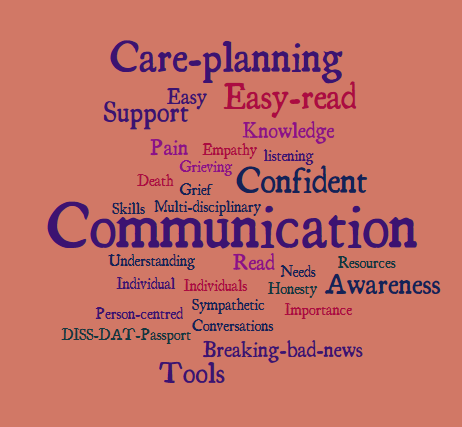
The project team included Rosalyn, Stacey, Nicola, and Tracey working collaboratively between the Hospice and LD community nursing service in Kent. As with many health and social care professionals they have experienced first-hand some of the challenges faced by health staff, families and carers at the difficult time of end of life care.
The project was created in response to a story shared by Nicola from a hospice experience of caring for someone with learning disability receiving end of life care.

The Residential Care Home, where he had lived for many years, were struggling to support him as he was coming to the end of his life with the required support to enable dying there. He was becoming more distressed at the hospice, continuing to ask to go home; the hospice staff were finding it hard to establish clear communication to provide explanation and reassurance. After some time and perseverance, it became evident that to be able to communicate with this man you had to do so by using “Dr Who” as a point of reference; his favourite TV programme. The barriers were broken and planning and care was improved and the gentleman died comfortably in the hospice.
As a result of this story, it became apparent that there was a gap in the understanding of end of life care and palliative care issues in homes supporting people with learning disabilities. This led to the hospice and Kent Community Health Trust, in collaboration with Canterbury Christchurch University identifying a need for a project to identify a way in supporting the wider community in developing skills in end of life care for people with learning disabilities.
Reflection and discussion between the hospice and the LD specialist matrons at the Community Health Trust, led to a training bid submission which was successful. The project was funded by Health Education England working across Kent, Surrey and Sussex (HEEKSS). The overall project aim to improve and steer best practice for caring and supporting people with learning disabilities and those important to them at their end of life by providing training. The response to the gap in service provision was to deliver collaborative training sessions shared between learning disability nurses and hospice nurses. The project team came together with shared interest and experience in end of life care and LD.
Services attending the training sessions were from private organisations, charities, hospices, NHS acute, NHS community and social care.
The time we invested in this project was intense and as nurses our commitment to our normal workloads and the project ensured we delivered. Each training session generated a lot of emotion, reflection and digging deep of clinical knowledge and skill sharing. After each days training we would review the evaluations and amend the content, reflecting on the learners needs and critiquing ourselves after each session. We delivered the training under academic scrutiny as the bid also included funding for evaluation of the whole project by Christchurch University in order to assess the effectiveness of the project.
The training brought in people working in various areas, with a range of professions and experiences attending. Initially it had been thought that this training would be developed for care and support workers, but the uptake of the training was greatly welcomed by professional staff from both the local community and acute hospital trust.

The programme of learning was underpinned by development of materials and information which was provided prior to the training. This included an action plan for personal development, in order to embed learning with resources to read. This workbook could also be cascaded to colleagues who could not attend.
Included in the training; Advanced Care Planning, understanding death and dying, bereavement and loss and supporting the social, psychosocial and spiritual needs of family and carers. It became evident during the training that there was a greater need for information on advanced care planning. Several sessions focused on how to develop easy read information, this improved the confidence to work with people in their end of live and being person-centred because they had an opportunity to openly discuss end of life care and the barriers, they may have experienced.
We know that people fear talking about death and dying – COMMUNICATION is key. People shared that they chose to attend the training as a reaction from personal experiences and not from a clinical perspective. We considered that if we can support those people that are confident in delivering good quality end of life care it will have a knock-on effect on their colleagues. We still note that it is those that do not feel comfortable or confident in end of life care that will not and do not engage in such training.
After the training feedback provided suggested that the trainees understood that maybe their initial thought of a ‘one pathway fits all’ approach to end of life care was not a realistic approach. They said they felt more prepared to embrace person centred end of life care. Those that attended these sessions said they already felt more confident with end of life care, they had an increased knowledge of symptoms and management and an understanding of assessment tools and specialist resources.
The learning disability health team has had an increase in relevant referrals to community Learning Disability Team for support and this has opened proactive communication and multi-sector engagement. On a personal level this project has enhanced our own knowledge and skills giving us a broader view of other services and professional experiences.
The training needs to be provided at regular intervals, informing and supporting professionals to provide a better outcome for people with a learning disability at end of life.
From being involved in this project the LD nurses were nominated and short listed for a clinical award within the community trust. Poster presentations made at the Palliative Care for People with Learning Disabilities Annual Conference and the annual Hospice UK conference 2018, Trust QI conference 2019. We shared the project at the Clinical Improvement Forum within the trust and at the AHSN End of Life Conference across Kent Surrey and Sussex. July 2019 we have delivered the project presentation at the Academic Session. We have received positive feedback and hoping to find a way of delivering a tailored training package regularly within the Alliance so that health and social care colleagues can benefit from the development opportunity.
The completed full and easy read reports along with accompanying training materials are all available freely at the following link:
https://idhekss.wordpress.com/reports/a-z/#eolc2
For more information, please contact the Clinical Support Team at kcht.clinicalsupportteam@nhs.net
ADDENDUM 190919 – all the resources are now also available at: : https://www.kentcht.nhs.uk/download/ld-eol-training-summary-report/
